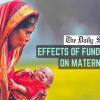Ignoring child nutrition today will cost the nation tomorrow

Amid continued focus on economic crises, dollar shortages, and political developments, one topic that perhaps impacts our long-term future the most—the nutrition level of our children—hardly comes into discussion. Children, especially those under five years of age, have no voice in the public realm, whether in politics, policy planning, or in our parliament. As a result, a crisis of nutrition among children is quietly in the making.
At a roundtable discussion organised jointly by The Daily Star and icddr,b, experts noted that there has been some improvement in this regard in recent years, but given the prevalence of stunting and wasting among children under five, Bangladesh may not meet the Sustainable Development Goals' (SDG) targets by 2030. Besides, statistics and percentages often hide the real picture. Take, for example, the stunting rate among children under five, which came down from 41 percent in 2011 to 21 percent in 2022—it does not really convey the reality of the millions who are still stunted.
When these children become adults, the deprivation of proper nutrition during their most crucial development years is likely to haunt them for the rest of their lives. According to experts, 80 percent of brain development occurs between birth and three years of age. As such, even if an adult increases their nutrition intake, they will not be able to reverse the harm done from lack of nutrition in the early years.
When these children become adults, the deprivation of proper nutrition during their most crucial development years is likely to haunt them for the rest of their lives. According to experts, 80 percent of brain development occurs between birth and three years of age. As such, even if an adult increases their nutrition intake, they will not be able to reverse the harm done from lack of nutrition in the early years.
One of the main causes of malnutrition among children under five is deprivation from breast milk. Sadly, in Bangladesh, the rate of exclusive breastfeeding has come down from 65 percent in 2018 to 55 percent, according to the most recent data. Reasons include inadequate campaigns to raise awareness on the importance of breastfeeding, an increase in caesarean deliveries, aggressive marketing by powder milk suppliers, an increase in the number of working mothers, and lack of space for nursing at workplaces. Child marriage, which remains quite high in Bangladesh, can also lead to malnutrition among mothers and children under five.
Ironically, we are not just depriving our children of proper nutrition; we have allowed toxins to seep into our food chain through excessive use of plastics, chemical fertilisers, and pesticides, harming their health and nutrition in the long run. Therefore, we must not only increase budget and manpower—especially at the grassroots—for nutrition programmes and raise awareness about breastfeeding and antenatal care. Child marriage must also be stopped, along with the use of harmful chemicals and plastics that toxify our food chain. It is time for an urgent call to action.


 For all latest news, follow The Daily Star's Google News channel.
For all latest news, follow The Daily Star's Google News channel. 









Comments